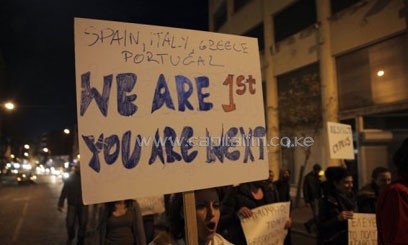Finance Minister Michalis Sarris issued a decree Wednesday for temporary limits on daily withdrawals to 300 euros ($385) to prevent the “collapse of credit institutions”.
Other measures include banning the cashing of cheques and ordering those travelling abroad not to take more than 1,000 euros out of the country.
With homes and businesses increasingly short on cash, the central bank confirmed that branches, closed since March 16, would finally reopen from 12 noon (1000 GMT) until 6pm (1600 GMT) on Thursday.
Five shipping containers reportedly filled with billions of euros were delivered to the central bank in Nicosia late Wednesday, an AFP photographer said.
The decree came as around 1,500 anti-austerity protesters marched on the presidential palace to protest the EU-IMF rescue package, which delivers a major hit to big depositors and threatens thousands of jobs.
Protesters chanted “Troika out of Cyprus”, substituting “Troika” for “Turkey” in a chant traditionally used to condemn the 1974 Turkish invasion.
Under a deal agreed in Brussels on Monday, Cyprus must raise 5.8 billion euros to qualify for a 10-billion-euro bailout from the “troika” of the European Union, European Central Bank and International Monetary Fund.
Depositors with more than 100,000 euros in the top two banks – Bank of Cyprus (BoC) and Laiki or ‘Popular Bank’ – face losing a large chunk of their money.
Cyprus also agreed to major reforms to its banking system, heavily dependent on the Russian money invested within – an estimated $31 billion in corporate and private deposits.
Although Monday’s deal kept the Mediterranean island from crashing out of the euro it has provoked fury at home.
Officials had originally said all banks would reopen on Tuesday, but then announced they would open two days later, which was not confirmed until Wednesday.
“The banks will serve the public tomorrow from 12 noon to 6pm,” central bank spokeswoman Aliki Stylianou told AFP. She was later cited by Cyprus News Agency as saying regular working hours would resume Friday.
In his decree, Sarris said the strict capital controls would be temporary.
Under its terms money transfers to accounts outside Cyprus are forbidden, with some narrowly defined exceptions, and there is a limit of 5,000 euros monthly in credit or debit card purchases while abroad.
Speaking of the talks in Brussels, Sarris told the private television station Sigma on Wednesday night “there was an obsession to close” both BoC and Laiki.
“We will see worse days in 2013… the economy will go into deeper recession,” he warned.
Cyprus is the first eurozone country to impose capital controls after bailouts – unlike Greece, Spain, Portugal and Ireland, which have also received multi-billion-dollar rescue packages.
Sarris’s decree said that the restrictions were in place to prevent a run on the banks as depositors tried to get their money out, which would see the financial system collapse and destabilise the economy.
Bank employees union ETYK appealed to the public not to take out their frustrations on bank staff, saying that they too were “victims of criminal acts”.
Some 1,500 protesters, led by the opposition communist Akel party, waved Cyprus and red flags and chanted angry slogans against the “troika”.
“The European Union is governed by dictators in Brussels… (and) has been established for the benefit of the banks and the big corporations,” said Michalis Thoukidides, a former banker.
The bailout involves restructuring BoC and eventually winding down Laiki, whose “good” assets will be absorbed by the bigger bank.
BoC chief executive Yiannis Kypris was sacked by the central bank governor on Wednesday a day after the bank chairman’s resignation was rejected.
Kypris said he had been asked verbally to tender his resignation, adding: “The reason given was the restructuring of the bank under the law approved by parliament and the demand of the troika.”
In the Greek capital Athens meanwhile, a bomb exploded on Wednesday night near the home of former BoC executive Nikos Tsakos, a Greek shipowner who had served on the board of the Cypriot lender. Nobody was injured.
Laiki depositors face losses of up to 80 percent on deposits above 100,000 euros, while BoC savers have been warned they stand to lose 40 percent.
Thanks in part to comments by Eurogroup chief Jeroen Dijsselbloem Monday that appeared to suggest that the harsh terms of the Cyprus deal could be repeated elsewhere – comments later retracted – the markets remained nervous.
At one point Wednesday the euro sank to below the $1.28 line for the first time since November.
European and US stock markets closed down, and in early trading Thursday in Asia markets were also slipping amid fears over Cyprus.
Investors were worried about “the ‘contagion effect’ of a possible run on banks spreading to other parts of the eurozone,” SMBC Nikko Securities general manager of equities Hiroichi Nishi told Dow Jones Newswires.



































